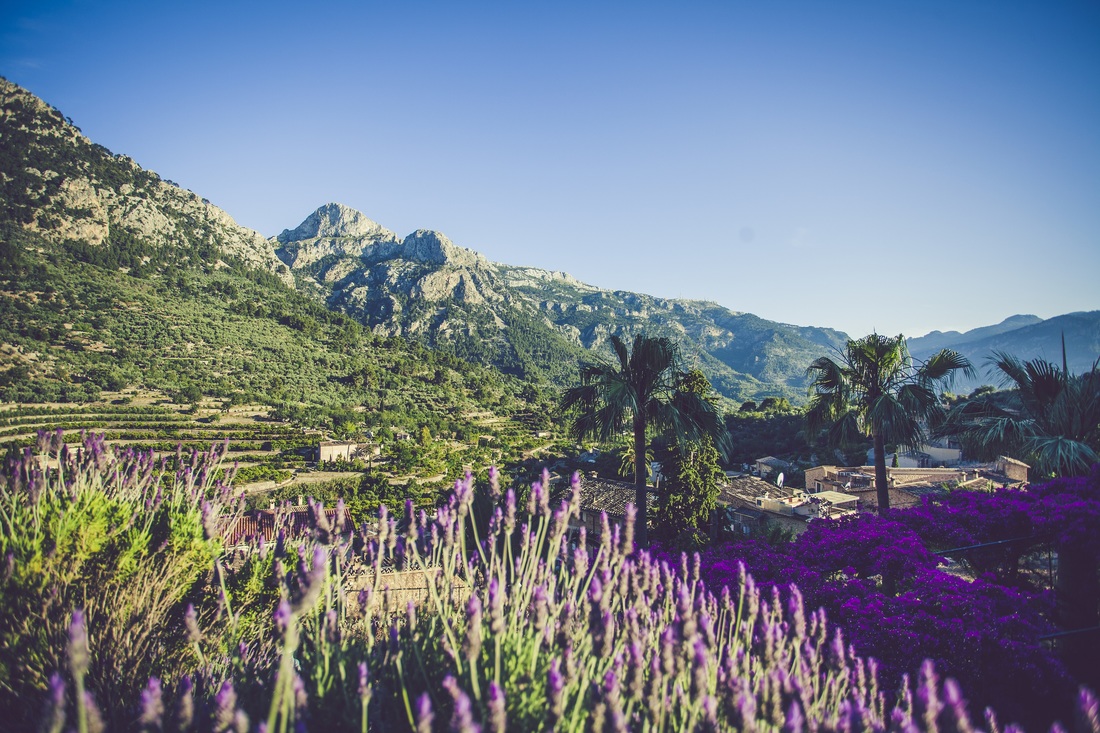Travel tips for elimination diets and autoimmune conditions Oh how I love to travel. A trip aboard is undoubtedly the highlight of my year and helps to break up the monotony of the daily grind. Punctuating the year with little trips keeps me focused, gives me purpose and reminds me what the sun looks like. We all need to make time for regular breaks whether at home or away as they are rewarding, restorative and feed your soul.
More than anywhere else, I adore Europe (please don't mention brexit). I love the people, the culture, the food, the hospitality, the architecture and those hidden mediterranean coves that no one else has found. I admire that they value family and community above all else in a way we have failed to grasp in the UK. The Italians and Spanish will come together with family and friends to luxuriate over prolonged lunches prepared with love and care. Every dish is a celebration of real ingredients. They take their time and understand the importance of sitting back and appreciating the small things in life. In the UK we are in a perpetual rush. We want to eat now, on the move, in between meetings. We are permanently racing against the clock, shrouded in a cloud of stress. Even planning a break away becomes a taxing event. Our hectic lifestyle so deeply embedded in us that it takes a few days of being away to actually acclimatise and switch off. When you're stressing over whether a third pair of flip flops are required or trying to recall the safe place where you left the plug adaptors, the last thing you want to worry about is whether or not you're going to be able to feed yourself when you arrive. If you're anything like me, food is a big part of the holiday experience, so trying to dine out abroad with an autoimmune disease or food intolerance can be frustrating and limiting. Particularly if you are on a restricted elimination diet. After my initial diagnosis it never occurred to me to plan ahead. I ignorantly assumed I would always have plenty of choice when eating out. I was wrong. On one particular day trip to an unfamiliar beach, I arrived fully prepped for a good solid day of bronzing, but without a bite to eat. As the day progressed and the hunger grew, my only source of snacks was to be a vending machine or tiny local shop. The vending machine only dispensed variations of gluten and sugar laden treats so I ventured to the shop. In desperation I purchased some rice cakes, and a pot of peanut butter. This is far from ideal at the best of times, but when you are sat in direct sunlight of 30 degrees plus and your mouth is bone dry, the combination of rice cakes and peanut butter only serves to cement your mouth together for the rest of the day. Not to mention do nothing to quell a ravenous hunger. To avoid your own rice cake gate, it simply takes a bit of forward planning. These are my top tips: Research your destination Read up on your destination country. You should always be able to find gluten free/allergen free options but some countries are much more geared up for this than others. Some are so on it that they have their own coeliac and allergy societies that will list approved restaurants online, others simply don't have a clue and you'll need to exercise more caution. If you know what to expect, you won't be disappointed. Allergy cards Print a coeliac/allergy card in the language of your destination - these are readily available online. I have found travelling with a foreign coeliac card invaluable as it explains your condition so throughly there is little margin for being accidentally glutened. You should present it to your waiter as soon as you arrive and before you take your seat, that way you will know if they are happy to accommodate you and they can provide you with appropriate choices. If you don't feel confident that they can accommodate you, don't risk it and find an alternative restaurant. Research restaurants Research the local restaurants before you go and check out the menus. Drop them an e-mail if you can, explaining your allergies and intolerances and ask them if they are prepared to adapt dishes for you. If you have the option, pre-book a table so you know you definitely have some 'safe' meals lined up. If they really look after you then you know you can return there for another meal. Supermarkets Get on google maps before you go and locate the nearest supermarket or convenience store to your accommodation. Try to visit on your first day to assess what they have and stock up on some basic supplies and emergency snacks. Get a kitchen If you are prepared to at least to do a little cooking on holiday, I recommend staying in an apartment or rental property. If you have located a supermarket and you have your own kitchen you will always have options if you are finding yourself short of safe restaurants. This way you can at least prep your own breakfasts, make a picnic for days out and then head to safe restaurants for dinner. Hotels If you are staying in a hotel, inform them in advance of your dietary requirements and find out if there is a fridge in your room for supplies. Hotel breakfasts are typically a gluten fuelled affair and rarely friendly to restricted diets. Don't feel rude asking the hotel in advance if they can get something in specifically for you - they can only say no. If you are on a Paleo or AIP diet you will often find cold meats and fruit available. Planes, trains and automobiles Take snacks with you for plane/ train/long car journeys. Plane food is poor at the best of times but when you have food intolerance/digestive condition its barely worth even glancing at the menu. You should be able to carry solid foods in your hand baggage - fruits, vegetables, veggie crisps and nuts. Just nothing in liquid form. If you aren't sure whether you can carry it on board, check with your airline and explain your condition. Supplements Take supplements with you to support your digestion in foreign lands. Digestive enzymes will help to support the breakdown and assimilation of nutrients. L-glutamine will soothe inflammation and support a distressed gut. Probiotics to support gut flora. Optibac have a great range of probiotics and are a UK based company. They have a probiotic specifically for travelling and I have had great results with saccharomyces boulardii when abroad. Whats more, unlike other probiotics they do not require refrigeration. Both will help to prevent diarrhea and unsettled tummies. Routine This is a hard one when you are on holiday and just want to let go, but autoimmune conditions always benefit from a bit of routine. Now i'm not trying to sound like your mother, but if you don't stray wildly from your usual habits it will be worth it in the long run. Make sure you get plenty of R&R and don't over exert yourself. Try to maintain a reasonable sleep routine, drink plenty of water, get plenty of fresh air and enjoy the sun on your skin. Just a few nights missed sleep, some poor food choices and too much over indulgence will be enough to throw you off kilter and leave you struggling when you return home-sometimes for weeks on end. Enjoy everything in moderation knowing that you will still feel good when you return home. Snacks Pack snacks for any day trips or have a restaurant lined up at your destination. Don't risk rocking up somewhere and hoping they will cater for you. It will inevitably be the one time there's nothing on the menu and you are facing a three hour journey home in a coach hotter than the earths core. If you are on a very strict elimination diet you will rarely find any options you can eat as they are, but please don't be disheartened. If there is nothing plain on the menu, don't be afraid to ask for something different - I have done this plenty of times and you would be amazed by how accommodating people can be. I've had some of my best restaurant experiences abroad even on a very strict diet. I've had may meals that are totally compliant with the AIP, low FODMAP diet and taste fantastic, yet are so simple. Plus everything tastes better when you don't have to do the washing up. If you are on a standard Paleo diet, you will generally find a plain fish/meat and veg or salad option. The hardest thing here is knowing you are on holiday and wanting to indulge. The key is finding the perfect balance between letting go and still remembering to looking after yourself. Just plan ahead,and you won't be disappointed.
2 Comments
Kristen
17/7/2016 19:23:32
Thank you for your website!
Reply
Emma
18/7/2016 07:03:55
Thank you so much for your kind words Kristen. I hope my posts continue to be helpful to you. Although getting diagnosed is a shock to the system, it really can be viewed as a huge positive. You can now move forwards being a much happier, healthier version of yourself. For me, my diagnosis was the best thing that happened to me and it's dramatically changed my life for the better. It won't be long before you are feeling the benefits too :)
Reply
Leave a Reply. |
Emma CarterThis blog tells an ongoing story about me and my journey back to health and happiness. A boho soul always looking for my next European adventure. I am a Coeliac, Yogi, paleo advocate, dreamer, Bon jovi connoisseur, sun worshipper, snuggly jumper wearer and wife to my lovely Paulie. Archives
April 2017
Categories
All
|



 RSS Feed
RSS Feed